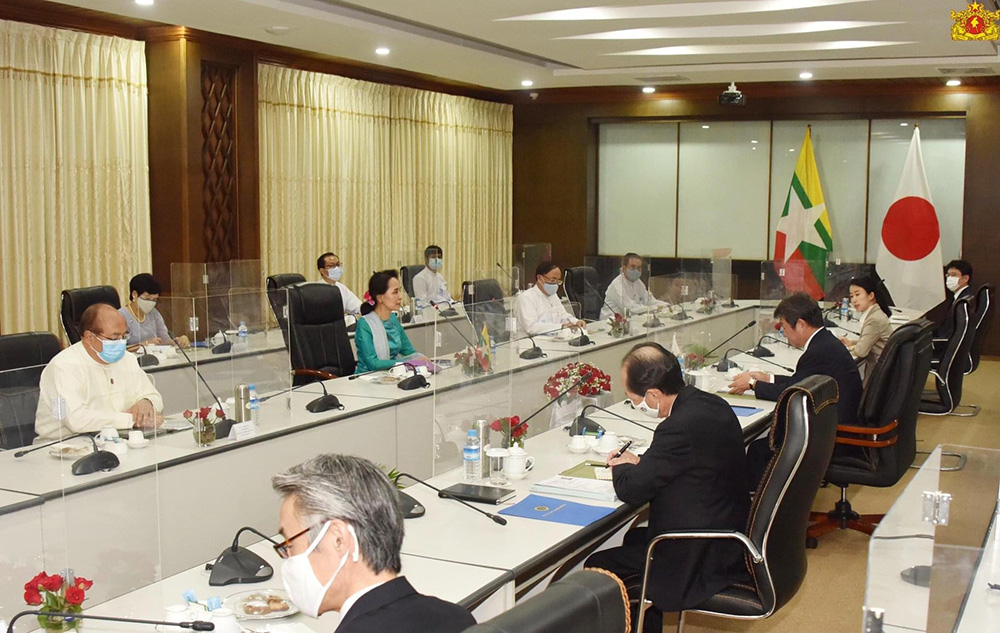YANGON—Japan’s Foreign Minister on Monday told his Myanmar counterpart that Japan would fully support Myanmar’s democratic nation-building efforts by bringing together both the public and private sectors, while in a separate meeting urging the country’s military chief to disclose the procedures and the nature of the punishments imposed on a group of his troops convicted of human rights abuses in Rakhine State.
During Monday’s meetings between Japanese Foreign Minister Toshimitsu Motegi and Myanmar State Counselor Daw Aung San Suu Kyi—who is also foreign minister—and armed forces commander-in-chief Senior General Min Aung Hlaing, the two sides discussed issues ranging from the need for a free and fair election later this year, reopening the country’s borders to long-term residents and businesspeople, and financial support to help improve conditions in Rakhine State.
In his discussion with the Myanmar State Counselor, Motegi said Japan had decided to provide an additional 30 billion yen (385.25 billion kyats) in emergency budget support and 15 billion yen in ODA (overseas development assistance) loans to support small and medium-sized enterprises (SMEs) in Myanmar in response to the global COVID-19 pandemic.
Japan’s Ministry of Foreign Affairs said in a recent statement that it had dispatched to Myanmar medical supplies and equipment worth over US$30 million (40.83 billion kyats).
The statement also said both sides agreed to continue discussions on commencing the “Residence Track” in early September. This will enable long-term residents to travel between the two countries while maintaining the requirement of a 14-day quarantine at home or in another designated place upon arrival.
The two countries also agreed to relax restrictions on the entry of Myanmar technicians and businessmen to Japan under the “Business Track” program, which will enable business travelers to conduct business activities in limited areas during their 14-day quarantine.
Motegi said Japan would fully support Myanmar’s own efforts to improve the situation in Rakhine.
He expected the investigation and prosecution of human rights abuses to proceed in a transparent manner based on the recommendations of the Independent Commission of Enquiry (ICOE).
Motegi stressed the importance of steadily implementing the order on provisional measures issued by the International Court of Justice (ICJ), promptly repatriating displaced persons and creating an environment conducive to the repatriation of displaced persons.
More than 700,000 Rohingya have fled Myanmar to neighboring Bangladesh since August 2017 to escape military operations that the UN has called a “textbook example of ethnic cleansing.” The Myanmar military denies these allegations, insisting the crackdown was a response to coordinated attacks on security outposts in Rakhine State by the Arakan Rohingya Salvation Army (ARSA).
In response to the allegations, the Myanmar government formed the ICOE in 2018 to investigate allegations of human rights violations and related issues following terrorist attacks by ARSA in Rakhine State. In January, the ICOE released a report that includes findings of “mass killings” and other atrocities against Rohingya Muslims during military clearance operations in Rakhine.

One month after that, the military announced that it would investigate and open court-martial proceedings against soldiers accused of mass killings in northern Rakhine State in 2017, as recommended by the ICOE.
Daw Aung San Suu Kyi said that what the Myanmar government most needed was assistance in strengthening its own capacity to resolve its challenges. She said she appreciated Japan’s support with capacity building in the security and administrative sectors in Rakhine State.
During his meeting with Snr-Gen Min Aung Hlaing, the Japanese foreign minister said he hoped to see progress in military investigations and prosecutions in relation to the incidents in Rakhine State under the Amendment Bill of Defense Services Act submitted to the Assembly of the Union.
He said it was important to disclose the procedures and nature of the punishment to the greatest extent possible.
In July, the Myanmar military received criticism from human rights organizations and legal experts for declining to reveal any details of its recent prosecution of three army personnel for the killing of 19 Rohingya in Gutar Pyin Village during clearance operations by the Myanmar military against ARSA in northern Rakhine State in August 2017.
Snr-Gen Min Aung Hlaing explained the military’s efforts to solve the Rakhine issue and expressed his intention to continue to work as [head of] the Myanmar Defense Services to solve the problem, according to the statement.
Motegi expressed his strong expectation that a free and fair election would be held with the cooperation of the Defense Services.
Myanmar is scheduled to hold a general election in November.
The senior general said the Defense Services would cooperate in the holding of a free and fair election, according to the statement.
Japan is planning to dispatch an election observer mission led by Yohei Sasakawa, special envoy for national reconciliation in Myanmar, which will provide special ink to prevent double voting.
During the meetings between the Myanmar leaders and the Japanese foreign minister, the two sides also exchanged views on the South China Sea and North Korea, and concurred on the need for deeper cooperation between the countries.
Myanmar is the final stop on Motegi’s tour of four Asia-Pacific countries, which took him to Papua New Guinea and three countries in the Mekong region (Cambodia, Laos and Myanmar) from Thursday to Tuesday. The trip was aimed at exchanging views on concerns and interests such as cooperation on the realization of a “free and open Indo-Pacific”; the situation in the South China Sea, which is an urgent challenge for the international community and the region; and North Korea.
During the trip he also exchanged views on cooperation with Mekong countries to resume cross-border travel, and promoting cooperation on a range of other issues including response measures to COVID-19
You may also like these stories:
NGO Activities Restricted in Myanmar’s Rakhine State Amid COVID-19 Spike
Suu Kyi Tells Her MPs They Depend on Party’s Image

















